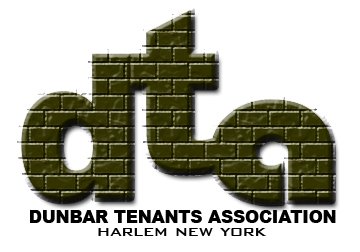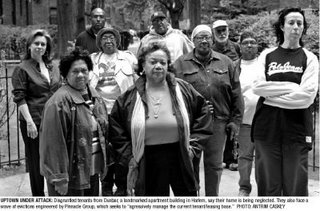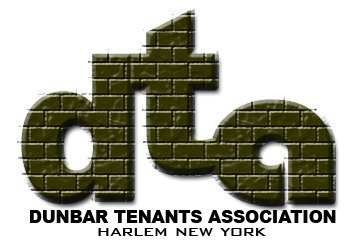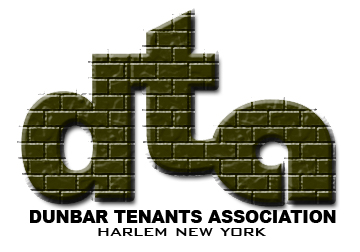
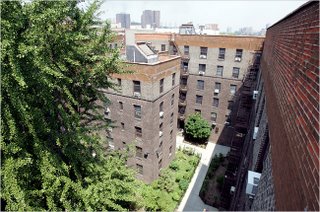
September 3, 2006
As Landlord Grows, So Does Criticism
By TIMOTHY WILLIAMS
Not long ago, Joel Weiner was a small player in New York City’s residential real estate industry. The properties he owned were neither extensive, nor impressive.
But during the past two years, Mr. Weiner, 57, and his firm, the Pinnacle Group, have spent more than $1 billion on hundreds of apartment buildings and quietly become one of the biggest property owners in neighborhoods from Brooklyn to the Bronx.
But Pinnacle has had pro
blems as it expanded: It is the subject of criminal investigations by the Manhattan district attorney and the state attorney general’s office; it has been denounced by Representative Charles B. Rangel and other politicians; and it has been the subject of angry community meetings and rallies and petitions signed by thousands of people who object to its business practices.
Last week, the attorney general’s office subpoenaed Pinnacle documents, including rent registration forms, as part of its investigation, Pinnacle officials said. 
The antipathy generated by Mr. Weiner and Pinnacle is the city’s latest entry in the time-honored landlord-versus-tenant struggle, between those who want to keep their rents down and those who want to raise them. But this one is being played out with perhaps greater passion because of a tight housing market and the breakneck speed of gentrification in recent years, which has seemed to transform many formerly undesirable neighborhoods overnight.
Critics accuse Pinnacle of buying buildings and firing superintendents within weeks. Questions have also been raised about whether the company has violated the city’s rent-stabilization laws by sometimes raising rents higher than is legally allowed, through such measures as passing along the cost of questionable renovation expenses. In one case, the cost of installing five toilets was passed on to a tenant in a two-bathroom apartment.
The critics also say the company has been engaging in harassment to force people out of their apartments. Tenants describe being put through a Kafkaesque tangle of eviction notices slipped under doors at night, and of legal challenges made to their right to live in longtime apartments.
In some buildings, one-quarter to one-half of the tenants have received so-called dispossess notices — typically the start of the eviction process — within a few months of Pinnacle’s purchase of the property. The company’s practices, its critics say, are a case study in the gentrification of some of the last working-class neighborhoods in Manhattan.
“We’ve been living here since it was the drug capital of the world, now we are sitting on a commodity,’’ said Rafael Gomez, 48, who lives in a Pinnacle building in Washington Heights, adding that people ask how “do we end up in such a beautiful neighborhood when we are poor people?”
Mr. Weiner denied criminal wrongdoing and said his goal was to be recognized as a model landlord. He has acknowledged raising some rents, but said the increases were necessary so he could provide safe, quality housing. His lawyers maintain that any errors Pinnacle may have made in seeking to evict tenants or in overcharging on rent have been the result of honest mistakes. The company rightly says costs of improving apartments can be legally passed on to tenants.
Mr. Weiner has not disputed that his company has sent out 5,000 dispossess notices to tenants in its approximately 21,000 apartments in the past 29 months. That, say adversaries, is itself cause for alarm.
“When you are trying to evict one out of four tenants, that is what lawyers call prima facie evidence,” Congressman Rangel said. “It is something that screams out for a criminal or civil or legal remedy.”
Mr. Weiner agreed to be interviewed, but did not want his photograph taken because, his lawyers said, he wanted to protect his privacy and because he had received a death threat on the Internet.
Mr. Weiner, who was born in Brooklyn and lives on Long Island, said his objective was to simply get tenants to pay their rents. And he makes no apologies for Pinnacle’s aggressiveness in moving to evict those late on rent or otherwise not legally entitled to live in his buildings.
“When you are in the trenches and you try to turn around a building, it’s not easy,” he said. He has hired a team of prominent lawyers, including former City Councilman Kenneth K. Fisher and Benjamin Brafman, a defense attorney whose clients have included Michael Jackson.
Mr. Weiner describes himself as a hands-on owner who visits his properties frequently and is a stickler for cleanliness, order and the removal of building code violations.
Although much of the criticism about him has focused on gentrification, Mr. Weiner said his recent purchases of buildings in neighborhoods like Washington Heights, Harlem, Inwood and the South Bronx would not necessarily lead to wealthier tenants moving in and displacing current residents.
“I don’t want to call it gentrification,” he said. “I want to call it meeting community needs.”
He said he typically raises rents after he buys a building in order to pay for the major improvements he must make because previous landlords have neglected many of the properties. Pinnacle legally passes those costs on to tenants in higher rent bills. “This is a very tough business,” he said. “I have a passion for doing it, and doing it right.”
In December 1997, Pinnacle owned 267 apartments in the city, and Mr. Weiner, though wealthy, was unknown, even to many of his competitors. But by May of this year, after an infusion of cash from the Praedium Group, a real estate fund that specializes in investing in inner cities, Pinnacle’s holdings had jumped to 21,642 apartments.
From May 2004 to May of this year alone, the number of Pinnacle-owned apartments had tripled, with most of the recent purchases concentrated in Upper Manhattan and the Bronx. Among its acquisitions — for $500 million — was the 2,900 apartment portfolio of Baruch Singer, who had become one of Harlem’s most notorious landlords because of the number of code violations and fines his buildings incurred.
Kim Powell, who in November 2005 helped start an anti-Pinnacle group called Brush — Buyers and Renters United to Save Harlem — said the group’s primary problem with Pinnacle was how it treats renters. “They have shown an absolute disregard for tenants,” Ms. Powell said.
The Pinnacle model has been to purchase what it refers to as distressed properties — typically apartment buildings that have numerous code violations, are in poor repair, and house many tenants who are behind on rent. The tenants in the 104 Singer buildings, for example, were in arrears for a total of $4.3 million, according to Pinnacle.
The company cleans up the building, often starting at the basement. It scrubs graffiti, installs exterior lighting, cameras and new front doors, and works on code violations. The rent-stabilization laws allow some or all of the cost of that work to be passed on to tenants in the form of higher rents.
Vacant units often get complete makeovers, including new kitchens. Landlords can also increase rents on vacant apartments by as much as 20 percent under state rent regulations. As a result, rents paid by incoming tenants are often significantly higher than what previous renters of the same apartment had paid.
Tenant advocates say Pinnacle is intent on raising rents to the $2,000-a-month threshold, which would remove the units that are vacant from rent-stabilization protection.
The law would then allow a landlord to rent those apartments for whatever the market will bear.
“That’s their business plan,” said Ken Rosenfeld, director of legal services for the nonprofit Northern Manhattan Improvement Corporation. “They’re testing the waters, they’re pushing the envelope.”
Mr. Weiner however, said that few of his apartments had reached the $2,000 level, and that he usually charges tenants less than the legally allowed rent because the current market cannot support higher rents. The city allows an occupied rent-stabilized apartment to be deregulated after its rent hits $2,000, but only if the tenants’ household income is at least $175,000 for two years in a row.
The Manhattan district attorney’s office and the state attorney general’s office have sought Pinnacle work invoices, eviction records, responses to tenant complaints and other documents to try to determine whether there is a pattern of fraud, whether the costs of renovations were exaggerated and false billings were submitted, officials said, speaking on the condition of anonymity because the investigation is ongoing. Some of the accusations against Pinnacle, as well as some details of the investigations, have been reported by The Daily News.
Mr. Weiner said he was cooperating with the inquiries and has pledged to change Pinnacle’s business methods if either office requests it. The company has also hired two community outreach workers with the goal of forming a community advisory panel that would help guide Pinnacle operations.
Further, the company said it was willing to turn over the files of the 1,256 cases it is currently litigating against tenants to elected officials so they can be examined. Finally, it has agreed not to seek to evict elderly tenants without first contacting the city Department of Aging.
“I am looking every day to improve the operation,” Mr. Weiner said.
Many tenants however, say they have had unsettling encounters with Pinnacle and its lawyers.
Karen Flannagan, 53, said that even after she had presented Pinnacle documents that established her residency rights to her Harlem apartment after her mother died, the company slipped an eviction notice under her door and took her to court. Her mother had been the leaseholder and the family had lived in the apartment along with Ms. Flannagan’s teenage daughter for several years.
“Here I am trying to grieve, and I am having to worry about me and my daughter being thrown out,” she said.
After two years and 10 appearances in housing court, Pinnacle abruptly dropped the case a few years ago, she said. Pinnacle lawyers, however, said recently that Ms. Flannagan’s original documents had not been sufficient, though in a statement this week the company said it regretted any inconvenience it had caused her.
Marjorie Charron, 56, and her husband, Ted Charron, 59, moved into a Pinnacle building in Harlem in 2001, paying $1,900 a month for a two-bedroom apartment. They were told by Pinnacle that by law, the company could have charged as much as $2,500.
When the couple realized that other tenants were paying far less, they found out that Pinnacle had claimed to have performed $20,000 worth of remodeling work on the apartment before they moved in, which gave the landlord the right to raise the rent by a corresponding amount.
When they examined Pinnacle’s invoices for the work done on the apartment, however, they found that the company had included charges for 160 light bulbs, 75 pounds of grout, 130 gallons of paint, a $198 nail gun and a $424 drain cleaning device. They also found that some items listed as installed were not there, including oak flooring and a pedestal sink.
Other costs included maintenance work such as painting walls and sanding floors, the costs of which are not permitted to be passed on to a tenant by a landlord.
Five years later, the couple was awarded $10,000 in rent credits from Pinnacle, although they say the company owes them at least $15,000 more. Pinnacle lawyers acknowledged having made mistakes in the Charron case, but continue to legally challenge some of the couples’ claims.
“The average person can’t do this, so by default, Pinnacle wins almost every time,” Ms. Charron said. In a statement this week, Pinnacle said the items had been “inadvertently misallocated” and apologized.
In another case, Erica Martinez, who lives in a Pinnacle building in Washington Heights, received a $1,317.83 rent credit from Pinnacle after the State Department of Housing and Community Renewal ruled that she had been overcharged. In addition, the agency ordered Pinnacle to pay her triple the amount of the overcharge — or a total of nearly $4,000 — because the overcharge had been deemed “willful.”
Pinnacle lawyers said the company had made mistakes in the Martinez case, but had not done so purposely.
In another case, Pinnacle has attempted to pass on charges to tenants for the $21,700 cost of new front doors in one of its buildings in Harlem, even though they were replaced several years earlier. The state eventually quashed the attempt and the tenants’ rents were not increased.
“Pinnacle, if by the second or third overcharge they had said, ‘Something’s wrong, lets make it right,’ I would have given them credit, but they never have,” said Hazel Miura, a tenant organizer in the Bronx.
Another Pinnacle tenant, Mark Gordon, was charged through his rent for the cost of five toilets for his apartment in 2001, even though he had only two bathrooms. Pinnacle’s invoices also included the cost of replacing electrical wiring that appeared not to have been replaced and a double billing for the installation of kitchen cabinets.
Mr. Gordon said three years and $10,000 in legal fees later, Pinnacle resolved the case by agreeing to lower his rent. While at the time, Pinnacle did not admit making any errors, the company recently acknowledged making a mistake.
But Pinnacle’s lawyers said that in only about 50 cases had the company been found to have overcharged tenants and that only about 6 percent of its units were currently under litigation. Pinnacle says that most of the tenants it has moved to evict have failed to pay rent for at least two months.
Mr. Weiner said he instructed his employees to work out cases with tenants amicably, and that he only used the courts as a final resort. His lawyers say that despite handing out thousands of dispossess notices, no more than 351 people have actually been evicted since 2004.
